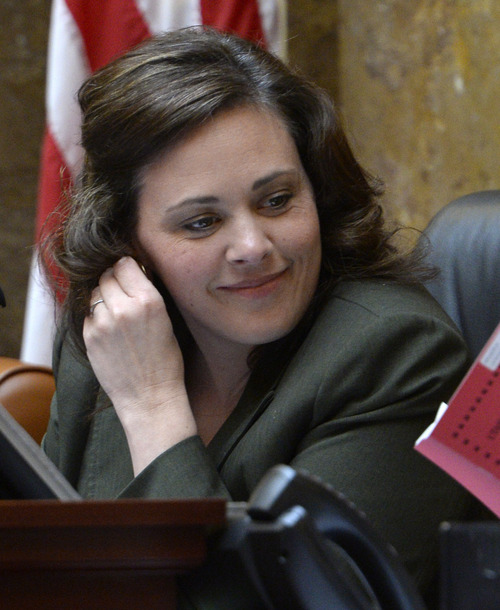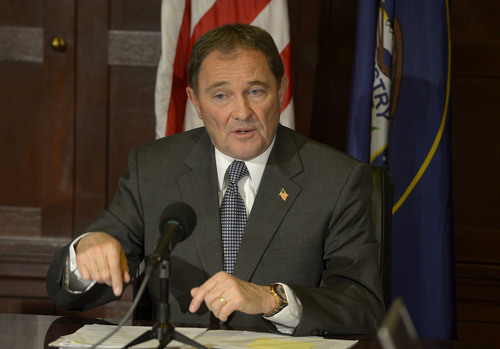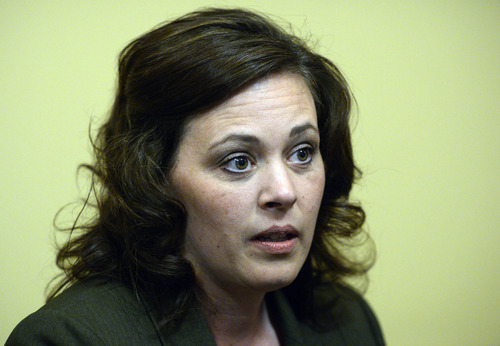This is an archived article that was published on sltrib.com in 2014, and information in the article may be outdated. It is provided only for personal research purposes and may not be reprinted.
House Speaker Becky Lockhart came away empty-handed in her bid to revolutionize Utah education, leaving the negotiating table over the weekend without any funding for what she hoped would be a $200 million education-technology initiative, according to multiple sources.
Lockhart's bid to put a digital-learning device in the hands of every Utah schoolchild was a bold initiative and would be the capstone of her 16-year legislative career, and possibly serve as a springboard should she decide to run for governor in 2016.
But in the end, Lockhart left the negotiating table rejecting even the Senate's offer of $26 million to take first steps on the initiative, three sources, aware of the outcome of the Saturday negotiations between the House and Senate, told The Salt Lake Tribune on condition of anonymity due to the sensitive nature of the talks.
Under Utah's Constitution, the Legislature must adjourn by midnight Thursday.
Senate President Wayne Niederhauser said Saturday that the talks were productive and Republican leaders hoped to be able to present details of a proposed budget agreement to their caucuses Monday morning.
Other members of the negotiating teams declined to comment. Lockhart did not return a phone call or text message seeking comment. Her chief of staff, Joe Pyrah, sent a prepared joint statement from House and Senate Leaders: "The House and Senate negotiating teams made significant progress Saturday. We'll report to the caucuses on Monday."
Early in the session, Lockhart floated her bold "One-to-One" education-technology plan, estimating it would cost somewhere between $200 million and $300 million to build out wireless networks in schools, train teachers and buy digital devices and software for Utah's more than 600,000 schoolchildren.
"Everything is on the table," she said early in the session. "There are no sacred cows. This is a transformational idea and we have to have a serious discussion about it."
But Senate leaders and Gov. Gary Herbert balked at the projected price tag. A report by the governor's education task force estimated that much more would be needed — $750 million the first year and $300 million in subsequent years.
Last week, Senate leaders offered $26 million to lay the groundwork for future funding and Herbert threatened to veto the program if it came in at more than $30 million.
"To put more than $30 million into a program that really nobody has heard much about, we don't know the details or specifics, that is going to rob from higher-needed programs … just seems to be wrong-headed and that would bring out my veto pen," Herbert said in an interview with The Tribune.
Lockhart said the $30 million was inadequate and "we can do a lot more with more than $30 million," expressing confidence that negotiations would yield a more favorable outcome.
Senators had offered more funding if Lockhart would consider a tax increase — either property taxes or gasoline taxes — but there was little support among House Republicans for either proposal, and Lockhart said, "We reject that notion."
The speaker also said she didn't think the state needed another pilot program on putting digital technology in schools, since districts were already moving on that front. She envisioned a state-level initiative that would streamline the purchasing and implementation of digital teaching tools on a much larger scale.
Other details of the budget deal are unclear, although there was generally broad consensus on the top priorities going into the budget talks.
Legislators and the governor had expressed support for paying to educate the 10,300 students expected to enroll in schools next year and increasing Utah's per-pupil spending by about 2.5 percent.
Senate budget chairman Lyle Hillyard had pushed for a similar 2.5 percent pay raise for state workers, and Herbert had advocated for about $25 million to equalize the percentage of college tuition that state dollars pay at Utah's colleges and universities.
Twitter: @RobertGehrke







